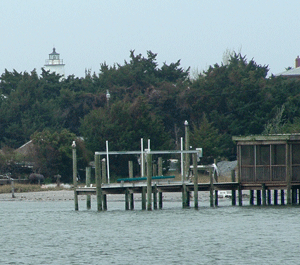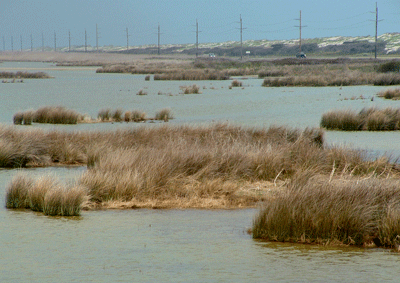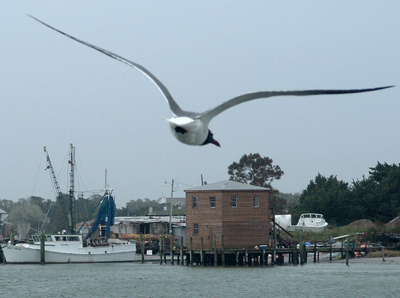 |
|
survey. Vince, on Jerry’s other side, snapped that he couldn’t
be bothered reading all theinput. Jerry, a hefty man in a t-shirt and baseball cap at Kirby’s left, jumped
in to object that he had email and he hadn’t gotten the email he got anyway, he had work to do. Herman whispered to me that Jerry was Jerry
Midgett of the Ocracoke Midgetts – clearly one of the “true locals.” Taffy sputtered about Wayne’s exclusive use of
email, didn’t he know he could use the postal service to deliver things to those without email, and for only thirty
seven cents?
Up in front another board member, a slim woman dressed in “office casual” called B.J., tried to placate Jerry by saying the
board members didn't realize he had email. Wayne angrily insisted that Jerry hadn’t put it on the contact list they
had circulated, and he could prove it, he had the original list. Members of the public – the audience – repeated the
charges that Wayne didn’t care about the true locals, and called again for him to step down. Wayne pounded the gavel,
|
|
said this wasn’t the purpose of the meeting, and threatened to adjourn at once. He looked to the two sheriffs at the
back to maintain order, but they blandly didn't meet his eyes. How long had their families been in Ocracoke?
The meeting moved on to its agenda, at which the tone cooled down and some of the public interest dried up. On the surface,
the issue is the enforcement of the Hyde County development ordinance, which has been lax to non-existent. Underneath
this issue, however, are the growing pains of a town that has gone from a remote fishing village whose residents had
all been there for as long as anyone could remember, to a tourist destination, a haven for outsiders seeking a quiet
life by the sea, a retirement community, and a place to build new “cottages” on the beach with twelve bedrooms, twelve
baths, and matching demands for water, septic, and parking. The true locals who once were the community are overwhelmed
by the new development, outnumbered by the newcomers, and not versed in the language and tools used to manage the kind
of community they have become. They feel shunted aside, left out of their own home.
The tools are standard planning ones – state requirements for septic, county building codes, setback restrictions,
impervious surface ratios, parking requirements, height limits. As the meeting progressed, Wayne, B.J., and Leonard,
a neatly dressed elderly board member, showed their fluency in the language of land use controls as they spun out
options in dialogue with the state planner and county inspectors assisting the board. Kirby, Jerry, and Vince sat
in stony-faced silence. Occasionally B.J. encouraged their input, but they limited themselves to “yes” or “that’s
okay.”
Herman provided a bit more background. Ocracoke is in Hyde County, whose seat is on the mainland in the town of Swan
Quarter. The mainland is a farming area, and very poor. With the new tourist development Ocracoke property values
have skyrocketed, so it provides the lion’s share of the county revenue. Ocracoke residents have suggested seceding
from Hyde County and joining neighboring Dare County, where they would not be the major source of funds for the local budget.
But Hyde County needs Ocracoke’s taxes, without them they would be unable to provide any services to the needy mainland
communities. Ocracoke feels poorly represented on the County Commission, and poorly served by the County staff, all
of whom are based in Swan Quarter, a five hour round trip just for a simple meeting.
Making matters worse, the county just did a property reassessment, the first in eight years. Ocracoke property taxes
shot up as a result – a windfall for Hyde County but a disaster for the town residents, especially the true locals
who are not investors in local real |


